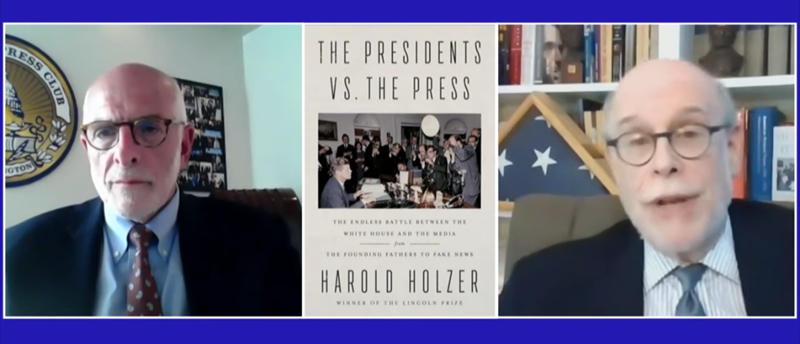'Twas Ever Thus: Harold Holzer on presidents and the press

Club President Michael Freedman interviewed author Harold Holzer Tuesday. Photo: Alan Kotok
"This combative relationship is not new. It's in a way healthy, as long as long as one side doesn't yield. Both institutions -- the presidency and the press -- are crucial to the democracy."
That's how Harold Holzer summed up his new book, “The Presidents vs. the Press: The Endless Battle Between the White House and the Media – From the Founding Fathers to Fake News," during a virtual Newsmaker event Tuesday hosted by National Press Club President Michael Freeman. Holzer is author or editor of dozens of books and a leading authority on Abraham Lincoln.
The "combative relationship" started with George Washington, Holzer said. After an initial press honeymoon, the first president was "besieged and bombarded with criticism from a newspaper loyal to the Republican-Democratic party, which was founded by Thomas Jefferson while he was a member of Washington's cabinet."
He went on to describe the interactions with the press of subsequent chief executives, including Jefferson, Jackson, Lincoln, Wilson, both Roosevelts, Kennedy, and Reagan. Through the 18th and 19th centuries, Holzer said there was a tradition of "strictly partisan media" and presidential "dismissal of the opposition press," something he said we've returned to, especially on cable. "The difference is that, especially when it comes to cable news, there isn't an admission that there's a partisan agenda," he said.
Holzer suggested that President Trump's relationship with the news media is not as radical a departure from that of his predecessors as some might think. "Yet, in a way," Holzer writes in his introduction, "Trump rails against the press much as his predecessors did -- just more publicly, more often, and with faster and wider reach."
Teddy Roosevelt, like Trump, expected to be on the front page of the paper every day, Holzer said. Likewise, Trump's use of Twitter, as a way of going around the press to communicate more directly with the people, is similar to FDR's fireside chats on radio, JFK's televised press conferences, and Bill Clinton's appearances on entertainment programs. Even Trump's close relationship with Fox News, Holzer said, is analogous to Andrew Jackson's inclusion of newspapermen in his "kitchen cabinet."
"'Twas ever thus," Holzer concluded, "and we'll get through it, as we have in the past, if we're vigilant."
